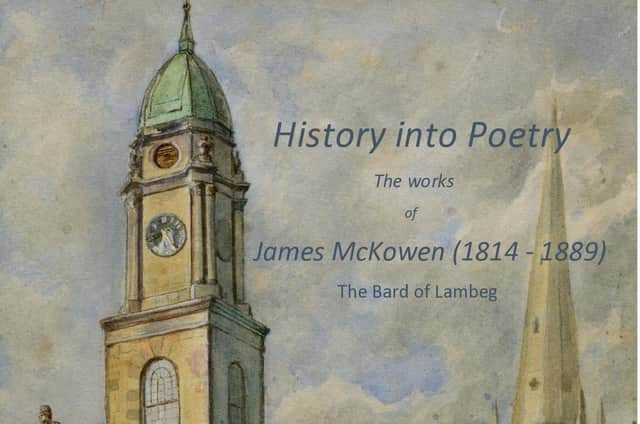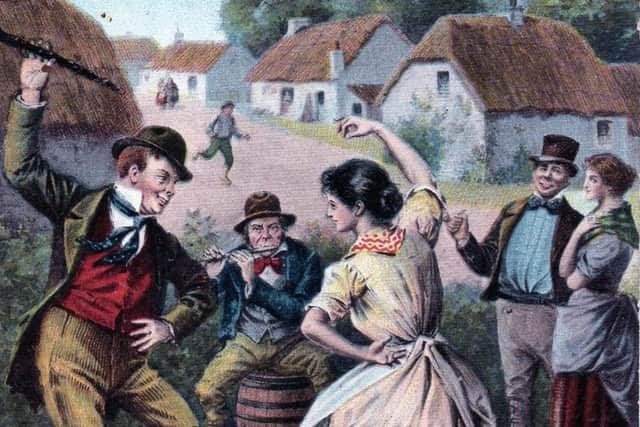New book is a ‘long overdue’ tribute to Lambeg Bard James McKowen


Known as ‘The Bard of Lambeg’, James McKowen (1814-1889) was a Lisburn man born and bred.
He lived first at Lambeg, moved later to Millbrook and spent his retirement years with his wife Rebecca at Beechside Terrace on the Old Saintfield Road. He went to school locally, widening his knowledge by extensive reading. He used Dunmurry Reading Society and searched the shelves of the Working Class Reading Societies in Belfast.
Advertisement
Hide AdAdvertisement
Hide AdAs a poet, John Hewitt identified James McKowen as belonging to the Ulster-Scots literary tradition of Rhyming Weavers, a group of rural working class poets that flourished in Ulster, during the 19th century. McKowen contributed verse under the pen name Curlew to the Nation newspaper and was well known as Kitty Connor in newspapers throughout the British Isles.


Although embedded in the Rhyming Weaver tradition McKowen was not a weaver to trade. He started work with Barbours at Hilden and finished his working life as a cloth finishing manager at Glenmore Bleachworks. From an early age linen laid out on the grass was a common sight for James McKowen and not surprisingly the linen green, the weaver and the bleacher figure in his poetry. In his choice of topical subjects McKowen reveals himself as a perceptive commentator, skilled in his use of a variety of verse forms to freely express himself on political matters, social issues, environmental topics, sporting events and agricultural trends. This type of poem is presented under the heading History into Poetry and each poem is provided with a narrative, which places it in its nineteenth century context.
Lisburn comes under the spotlight and McKowen shows great interest in the people who influenced and controlled the town. Local political intrigue and politicians interest him. Sir Richard Wallace was presented with McKowen’s verses and Wallace’s letter of acknowledgement sent from Paris, only surfaced during the preparation of this volume.
The Killultagh Hunt and the Whinney Hill races, near Castle Robin, conjure up exciting days of steeplechasing on the slopes above Lisburn, and you are invited to celebrate Master MaGrath’s win at the Waterloo Cup and stretch your legs to the Old Irish Jig.
Advertisement
Hide AdAdvertisement
Hide AdWith darker subjects you can experience his take on the sectarian disturbances in Belfast in 1857; the revolutionary outrage in 1866 and The Battle of the Brickfields, Lower Falls, his poem on the Belfast riots of 1872 – where he captures the opposing sectarian parties ‘hating each other for the love of God.’ A standoff between the Presbyterian General Assembly and the Secretary-for-War he just had to treat in the Ulster-Scots idiom.
The Mill Worker’s Strike of 1874, which affected Belfast and Lisburn, produces a powerful poem, as this extract shows. This is a good example of McKowen supporting the working classes over the pen-name Kitty Connor, who on this occasion was definitely a mill girl.
She huddles on her scanty dress ─
Has barely time herself to bless,
Through filthy lane or sloppy street
She threads her way with naked feet
To rooms that for her ten hours’ toil
Are redolent of rancid oil;
And in a steamy atmosphere,
With little joy her toil to cheer,
She spends that priceless blessing, health,
And helps to win her employer’s wealth.
You marvel that the girl grows weak! ─
You wonder at her sallow cheek!
Her strength has helped to build your villas,
Her sweat has bought your downy pillows,
And yet within a Christian land
You with this mill-girl higgling stand ─
And wonder why she’s so unwillintg
To let you clip her hard-earned shilling.
This book has been a long time in the making. It has taken 132 years. In April 1889, when James McKowen passed away after a short illness, his manuscripts were left with his friend Robert May, a wood carver, a Young Irelander and a collector of all things Irish. Later that year, May gave a talk on James McKowen in St Mary’s Hall, Belfast.
He informed his audience that he had manuscripts and newspaper cuttings and intended to publish a selection of the poet’s work. It did not happen. Robert May moved to London.
Advertisement
Hide AdAdvertisement
Hide AdThere, May was friendly with Dr John Smyth Crone, who came originally from the Castlereagh Road. Crone was the founder and editor of The Irish Book Lover. Robert May died without publishing McKowen’s work, but he had taken a simple precaution to safeguard the manuscripts. On the back of one of his business cards he had written: “Should any accident happen to me hand these poems over to Dr J. S. Crone”.
The poems were in safe hands. Crone was a collector extraordinaire. During his lifetime he had built up a collection of Irish books, pamphlets, maps, and manuscripts and on his death, in 1945, he bequeathed the collection to Belfast Central Library.
It included McKowen’s poems, now deposited in an archival box, still intact, 55 years after the poet’s death. They lay there largely undisturbed over the years.
In 1974, John Hewitt published Rhyming Weavers, his landmark study on Ulster poets. That tome confirmed McKowen’s place in that tradition, although McKowen’s manuscripts seem to have slipped under Hewitt’s radar.
Advertisement
Hide AdAdvertisement
Hide AdFast forward another 34 years from the Hewitt publication. In 2008, Gilbert Watson’s research led him to the archive in the Belfast Central Library. In a few visits, when he just skimmed through the manuscripts, he selected some of McKowen’s poems for his first book ,All Around Lambeg.
The memory of those manuscripts stayed with him and after a few years he decided to go through the archive methodically. He finished the book in May 2016 – over five years ago. He had to be patient – you could say that “the funding mills for historical books grind exceedingly slow.”
He enjoyed the research and he got to know James McKowen of whom it has been said that ‘few men enjoyed life with greater zeal than he did.’ His joyous temperament comes through in his writing and Gilbert Watson, as the editor, is pleased to have been instrumental in presenting his work to the wider public.
Over 200 years after his birth, this is a long overdue tribute to Lisburn’s lost poet, James McKowen, the Bard of Lambeg.
The book is only available at the Lisburn Museum reception.
Comment Guidelines
National World encourages reader discussion on our stories. User feedback, insights and back-and-forth exchanges add a rich layer of context to reporting. Please review our Community Guidelines before commenting.